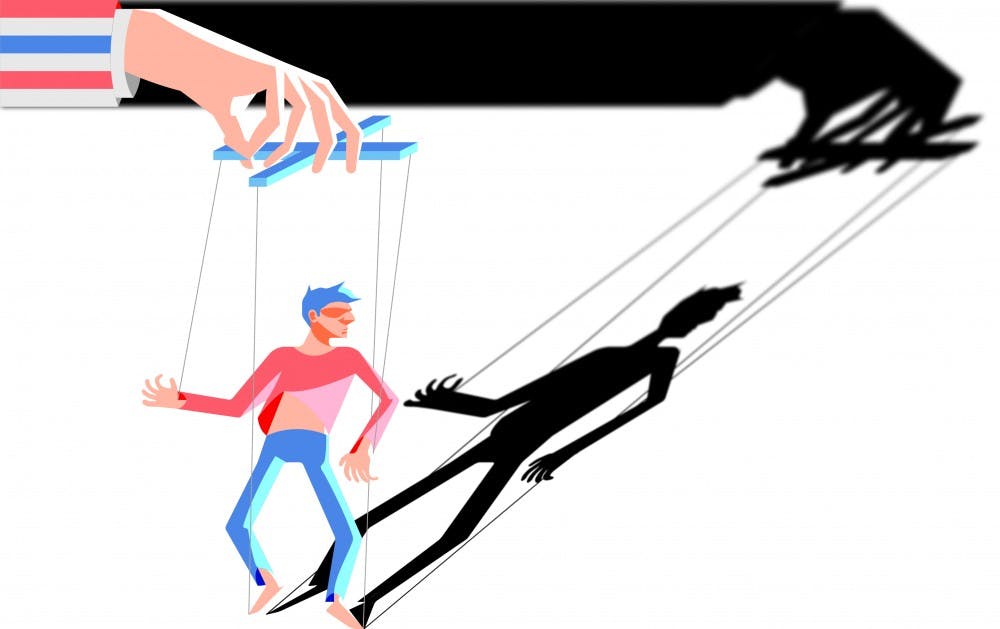It’s 1987. Arizona State University’s fraternity row is breaking seven laws per capita. Friday night, the Sigma Chi house is packed to the brim. Brock "The Rock" just slammed an unholy amount of brews through the beer bong to the chant of hundreds of similarly intoxicated youths. "The Ogre" is about to one-up him by butt-chugging a 40. Brock is 19 years old and will have a lifelong battle with alcohol addiction; The Ogre won’t make it past 30.
Could they have avoided these adverse consequences if only they had waited until the state-mandated legal age of 21 to start drinking? No. For wild habits like binge drinking, chain-smoking or joining the U.S. military, the threshold for entry is based on old science and mass-produced, made-on-the-fly "traditions."
A study conducted by the American College Health Association in Spring 2017 found that 59 percent of ASU students reported drinking alcohol, with the other 41 percent had not drank in the last 30 days. The drinking culture on campuses across the nation is rampant, and a good amount of it is undoubtedly done by underage drinkers.
The drinking age is arbitrarily set too low at 21. Recent science has shown that the human brain does not finish developing until the age of 25, not 21 or 18. This stage in late brain development is marked by crucial parts of the brain maturing: the prefrontal cortex and the frontal lobe. These control one's logic center, decision-making and judgement.
If these decisions were left to fully-formed adults and incentivized through a cultural shift of conscientiousness, then the U.S. would be left with no military, more wine-tasting trips in Napa Valley and the tasteful smoking of long cigarettes only for the purpose of social posturing and the occasional armchair philosophizing.
More than a neurological issue, though, the real problem with allowing Americans to make these life-altering decisions at such crucial junctions of development are the cultural implications. At more than one level, we incentivize teenage rebellion and stoke the flames of dangerous behavior.
If the bar were raised far beyond adolescence, then the prospect of participating would become much less tantalizing. The same goes for smoking; joining the military is even more deviously motivated by the state.
These kids, barely old enough to work, are brought on board a juggernaut of an industrial complex they barely understand. If the age to join the U.S. military were changed to 25, then recruitment would probably drop to unsustainably low levels.
This change would never be allowed despite its pointed benefit to the average American citizen. No longer could Little Caesars employees be bombarded by recruiters at the mall, and that’s something Uncle Sam couldn’t live with. To the age-old moniker, “I want you,” they should add, “to join the military before you’re old enough to think about your decision.”
American culture stands on few legs — like less than two. Just look at our food. We don’t have much outside of appropriation and American cheese. Similarly, American drinking habits, rather than following the logical progress of traditions that are intimately tied to an ancient food culture, hinge on empty practices like who can crush the most beer cans on their head before sustaining life-threatening brain damage.
This is in opposition to the alcohol culture of most places around the world, like Europe, where people can fastidiously handle their alcohol. Children can be seen drinking a glass of wine with dinner in places like France or Spain without going off the rails. It's a family affair, an old-world cultural norm.
In America, give a kid an alcoholic inch, and they take a mile. It’s one step from a shot of Jack Daniels with dinner to unplanned teen pregnancy. The true fact of the matter is that the drinking age of 21 is nothing more than an empty celebration to most Americans.
The federal drinking age in America was set on July 17, 1984, when former President Ronald Reagan signed into law the National Minimum Drinking Age Act. This galvanized states to support the feds in a national change to a drinking age of 21 by threatening to revoke 10 percent of highway funding.
This was in response to a drunk driving epidemic in the 1970s. The act did somewhat have its intended effect, with fatal crashes involving young drivers dropping 30 percent from 1982 to 1995. Though this was effective for its intended purpose, it does not take into account the stunting of neurological development caused by drinking, and especially binge drinking.
Just to give you a placeholder for the progress of popular science at the time: in the week prior to this, President Reagan declared ice cream “nutritious and wholesome.”
The prospect of the soon-to-mature Generation Z starting to drink instills a deep fear in me. From eating Tide pods and monotonous Fortnite dancing to calls for Bolshevik revolutions founded on 4Chan memes. It’s a small jump — catalyzed by ethanol — trust me. We must change the minimum drinking age before it is too late.
More than alcohol, there is an incumbent nicotine addiction that will overtake the nation. The advent of e-cigarettes, and now the insidious Juul, are making for a constantly stimulant-addled youth. States like California have recently changed smoking age restrictions to 21, but this is not enough.
Just raising the smoking age to 25, the age of peak neurological development, will not wane those youths already addicted. To buy nicotine products in the U.S., a special license should be issued. If the government had any sense, it'd make it so that one can only attain the license by passing a 50-question test and getting a cosigner with a 700+ FICO score. That’ll stop those pesky 14-year-olds from buying Juul pods at the nearest QuikTrip.
Though this would throw a wrench in the capitalist machine, the only legal stimulant left for the public to consume would be caffeine, thus prompting all Americans to take a shaky, reflective look at why we can only function in this society on high-level stimulants.
With most of America burnt out on stimulants, depressants would be next on the chopping block. The chemical cocktail that so many people's weeks hinge on having been rendered defunct, the drinking age could be raised even higher.
How can one truly appreciate the alcohol-inspired void without having gone through their first divorce? Based on an exhaustive study done by the law firm Wilkinson & Finkbeiner, the average age for an American’s first divorce is 30, making this the next logical legislative leap.
Why stop there? The Pew Research Center found that between 1990 and 2015, divorce rates in Americans 50+ went up 109 percent. If those people hadn’t consumed alcohol up to that point in their lives, then it is likely they would have divorced sooner because they would have been forced to take a real look at the problems in their marriage. All evidence points to a federal drinking age of 50 being just as, if not more effective than 21.
In line with these sentiments, the age hurdle one has to temporally jump over to enter the military should again be analyzed. Since changing the age to 25 would already drop recruitment to all-time lows, then lowering it to 14 would surprise everyone. Burgeoning pubescence would make the U.S. military the most angsty on the planet. The age restriction on being able to join, though, should be raised to 50 to match the drinking age.
Since all of those Americans won’t be married and, therefore, have nothing to live for, it would be easier for them to come to terms with their impending mortality. In line with Elon Musk’s recent commitment to making robot mecha battle suits, their frail bodies would not even be an issue.
Maybe the drinking age of 21, smoking age of 18 and minimum enlistment age of 18 all seem wantonly set when analyzed under a microscope. Maybe our youth should pull themselves up by their bootstraps and get over lifelong ailments tied to their participation in these age-restricted activities.
I mean, it's not like the government takes millions of dollars a year from the tobacco and alcohol lobbies, and it's not like the U.S. military has higher funding than any other military in the world. And they definitely couldn't take two seconds to research the age at which the human brain fully develops, and with their money, lobby for higher age-restrictions leading to a more conscientious America – one centered on health and longevity. Nah, that ain't it.
Can't handle a few beers because your brain isn't finished developing? Your fault. Develop lung cancer because you were wrongly educated on the dangers of smoking from a young age? Your fault. Be misinformed on how you can use your GI Bill and have no applicable skills for further employment? Your fault.
The search for culpability is an empty one, if only for the reason that realistic change can only come if legislation and culture walk hand-in-hand, not by finding who is to blame. Most people make it through life able to smoke a few cigarettes, binge drink all through their 20s and maybe even kill some foreigners for the U.S. government, but even one person falling through the cracks is too many.
Fallibility is to human nature as forward progression is to time (probably just an excuse we use to keep society functioning). Reevaluating the major age-restrictions we have set on our youth and backing them with hard, contemporary science is not an effort to make these systems perfect. It's just one to assure that they are functioning in a way that does not take advantage of our country's youth.
Editor’s note: This article was originally published in print in The State Press Magazine, vol. 19, issue 3 on Nov. 7, 2018.
The nature of this article is satirical and the opinions presented in this column are the author’s and do not imply any endorsement from The State Press or its editors.
Reach the reporter at aalmouai@asu.edu or follow @zamurai_96 on Twitter.
Like The State Press on Facebook and follow @statepress on Twitter.




